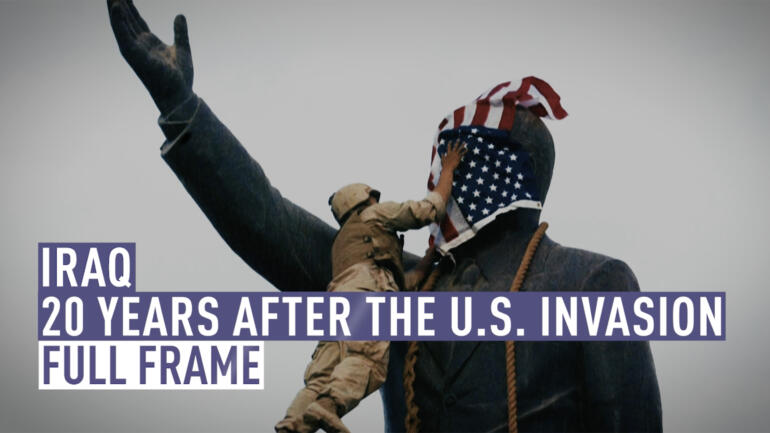Twenty years ago, the United States launched a major military invasion of Iraq. It was the start of a conflict that resulted in the destruction of most of the infrastructure and the deaths of hundreds of thousands of civilians.
‘Chaos’ and ‘destruction’ after invasion
“I have, like many other people who lived in Iraq, encountered many days when I thought to myself, I am going to die right now,” said Raed Jarrar, Director of Advocacy at the nonprofit, Democracy for the Arab World Now.
Jarrar was in Baghdad in 2003, hiding in a “safe room” at a relative’s home. He saw the first U.S. tanks rolling in and heard the first U.S. planes flying overhead.
“Occupying Iraq was a disaster. Dismantling the Iraqi army was an error…and that was a part of a bigger recipe that led to the complete chaos and destruction of Iraq,” Jarrar said.
Despite the destruction, Jarrar said he has hopes that his country will be rebuilt.
“The number one step is do no more damage. I think after that, giving some space for Iraqis to rebuild their country is the next step,” he said. “The good news in Iraq, unlike many other countries in the region, is that Iraq is a very rich country. So it has hundreds of billions of dollars worth of oil being pumped every year, and that could end up helping rebuild the country.”
Empowering Iraqi women and girls
An estimated 1.3 million Iraqis are at risk of gender-based violence, with the majority being Iraqi women and adolescent girls, according to the United Nations.
“It’s not like Iraq had the best education system in the region for many years, but because of the wars and the embargo on Iraq, these things went really down,” said Zainab Al-Suwaij, founder of the American Islamic Congress. “[Families] send the boy but not the daughter in the family [to school]. So you have a huge population of young girls uneducated, not going to school and not being able to understand anything.”
Al-Suwaij’s organization aims to foster tolerance, promote civil rights and mobilize the Muslim community in the United States. She has worked in Iraq to help rebuild the school system and develop women’s empowerment programs.
One of the efforts that she helped push through was to demand no less than 25% representation by women in the new government.
Women started actually becoming in the ministries in so many different government offices…So many other things followed that to help women being empowered, training women to be in a leadership position, to be in the Parliament, to be in different aspects of the government” Al-Suwaij said. “It was a huge task to do and it was successful.”
Musician plays on after fleeing Iraq
After the U.S. invasion in 2003, millions of Iraqis were displaced, including engineers, doctors, artists and other professional escaping the war. One of those refugees is musician Hussein Rassam.
Rassam lost both his parents in an attack.
“I didn’t accept it, to believe that they had gone…For three years I was lost,” he said.
In 2015, Rassam left Iraq. Traveling through Turkey, Greece, Serbia, Hungary, and finally ending up in Brussels.
“I was trying to communicate as a musician so I recorded an album with a label in Brussels then I continued my life as a musician,” Rassam said.
“I think playing a concert is stronger than sharing my story,” he said.
 CGTN America
CGTN America
